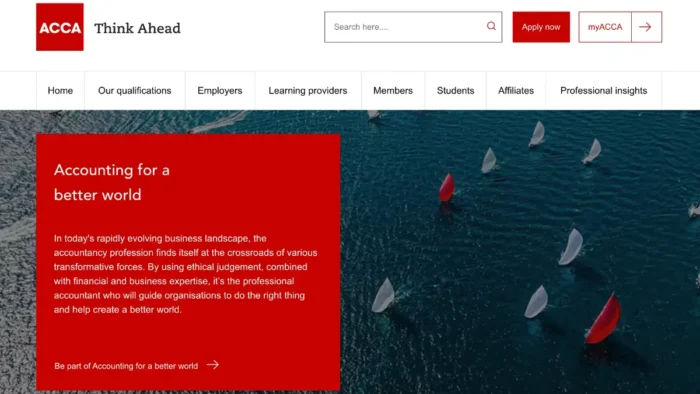Going into a career as an accountant can be both exciting and challenging. Whether you’re a numbers nerd or simply interested in the world of finance, the path to becoming an accountant requires dedication and a strong skill set. In this comprehensive guide, we will navigate the various steps and strategies to help you achieve your goal of becoming a successful accountant.
From understanding accounting tasks and the education requirements to gaining practical work experience, we will provide you with the essential knowledge to kickstart your accounting journey. We’ll explore the different certifications and qualifications available, such as the CPA (Certified Public Accountant) or ACCA (Association of Chartered Certified Accountants), and highlight the benefits of each.
Additionally, we’ll discuss important skills for accountants, such as attention to detail, analytical thinking, and problem-solving abilities. This guide will also delve into industry trends and technological advancements shaping the accounting profession, ensuring you stay ahead of the curve.
Whether you’re a business owner, a recent graduate, or considering a career change, this ultimate guide will equip you with the necessary tools and knowledge to become an accountant. So, let’s dive in and set you on the path to financial success!
Why Choose a Career in Accounting?

Undertaking a career in accounting offers numerous advantages and opportunities. It is a field that is in high demand, ensuring a stable and long-lasting career. The financial sector is an essential component of any organization, meaning that accountants are always needed. Additionally, an accounting degree provides a solid foundation for various other business roles, making it an adaptable career choice.
Moreover, this profession offers excellent earning potential. Accountants are well-compensated for their skills and expertise. Your earning potential will increase substantially as you progress in your career and gain experience. This financial stability is one of the key reasons why many individuals choose accounting as a profession.
Furthermore, the profession offers the opportunity to work in various industries. Whether you have a passion for healthcare, technology, or finance, accountants are needed in every sector. This allows you to pursue a career that aligns with your interests, ensuring job satisfaction and personal fulfillment.
Education and certification requirements for accountants

Specific education and certification requirements must be met to launch a successful career in accounting. The minimum educational requirement is a bachelor’s degree in accounting or a related field. This degree equips aspiring accountants with the foundational knowledge and skills needed to excel in the field.
However, some positions, particularly those in higher-level roles or specialized areas, may require a master’s degree or additional certifications. Advanced degrees, such as a Master of Accountancy or an MBA in accounting, can enhance your qualifications and open doors to more lucrative opportunities.
In addition to formal education, obtaining professional certifications is highly recommended in accounting. The Certified Public Accountant (CPA) designation is one of the most recognized certifications. The CPA exam is a rigorous and comprehensive assessment of an individual’s accounting knowledge and skills. Achieving CPA certification demonstrates high competence and dedication to the accounting profession.
Another well-regarded certification is the Association of Chartered Certified Accountants (ACCA). This global qualification is recognized in over 180 countries and covers various accounting and financial topics. The ACCA certification is an excellent choice for individuals interested in pursuing an international accounting career.

Skills and qualities needed for successful accountants
Becoming one of the most successful accountants requires unique accountant qualities and skills. While technical ability and knowledge of accounting principles and practices are essential, several other skills can contribute to your success in the field.
So, here are some of the top accountant qualities you need to possess to become a successful accountant.
- One crucial skill for accountants is attention to detail. You’ll analyze financial data, prepare reports, and ensure calculation accuracy as an accountant. A good accountant with a keen eye for detail will help you identify any discrepancies or errors, ensuring the integrity of financial information.
- Analytical thinking is another vital skill for accountants. You’ll often face complex financial situations requiring critical thinking and problem-solving abilities. Analyzing data, identifying trends, and making informed decisions are crucial for providing valuable insights to clients or employers.
- Leadership skills are also important accountant skills. As an accountant, you will work in a team-oriented environment where collaboration is crucial. You will be required to work closely with your immediate co-workers and colleagues in other departments. Additionally, you will need to collaborate with clients and customers to ensure their financial needs and requirements are met. Effective leadership skills are essential for success in the field. You will also need managerial skills if you are in a managerial position.
- Being an accountant requires dealing with a lot of paperwork, figures, and data daily. Staying organized is a must in this profession. To manage all these details and retrieve the required information efficiently, it is crucial to possess excellent organizational skills. Also, time management skills will help you achieve your and your client’s goals.
- Great communication skills are also essential for accountants. You’ll need to effectively communicate financial information to clients, colleagues, or stakeholders who may not have a background in the accounting process. Explaining complicated concepts and complex problems clearly and concisely is key to building trust and ensuring understanding.
- Furthermore, adaptability and a willingness to adopt technology are vital in today’s accounting landscape. The accounting field is rapidly evolving, with automation and digital tools becoming increasingly prevalent. Being open to learning new technologies and leveraging them to streamline processes will set you apart as a forward-thinking accountant.
Related: 10 Traits and Qualities of an Awesome Accountant
Different career paths in accounting

Accounting offers a wide range of career paths, each with its unique opportunities and requirements. Here are some of the most common career paths within the field:
1. Public Accounting
Public accountants work with clients from various industries, providing tax preparation, auditing, and financial consulting services. This career offers exposure to diverse clients and industries, making it an excellent choice for individuals and companies seeking variety and client interaction.
2. Corporate Accounting
Corporate accountants work within organizations, managing financial operations, preparing financial statements, and analyzing financial data. This career often provides the opportunity to specialize in areas such as managerial accounting, cost accounting, or financial planning and analysis.
3. Government Accounting
Government accountants work in the public sector, ensuring financial accountability and regulation compliance. This career path offers stability and the opportunity to contribute to public service.
4. Forensic Accounting
Forensic accountants investigate financial crimes and provide litigation support. This field combines accounting, investigative skills, and legal knowledge, making it an exciting and challenging career choice.
5. Internal Auditing
Internal auditors assess an organization’s internal controls, risk management practices, and compliance with regulations. This career path offers the opportunity to work closely with management and make recommendations for process improvements.
These are just a few examples of the many career paths available. Exploring your interests, strengths, and long-term goals is important to determine which path aligns best with your aspirations.
Steps to Become a Good Accountant

Going on the path to becoming an accountant requires careful planning and a series of steps. Here is a general roadmap to guide you on your journey:
1. Research and self-assessment
Begin by researching the accounting field and assessing your interests, strengths, and competencies for numbers. Consider speaking with professionals in the field or joining accounting organizations to gain insights and gather information.
2. Choose an educational path
Determine the level of education you want to pursue, whether it’s a bachelor’s degree or an advanced degree. Research accredited programs and universities that offer accounting programs and ensure they align with your career goals.
3. Enroll in an accounting program
Once you’ve chosen an educational path, enroll in an accounting program. Take advantage of financial accounting, managerial accounting, taxation, and auditing courses.
4. Gain practical experience
While pursuing your degree, seek opportunities to gain practical experience through internships or part-time accounting positions. Practical experience will enhance your resume and provide valuable insights into the profession.
5. Consider certifications
Research and decide which certifications align with your career goals. Determine the requirements and prepare accordingly, whether it’s the CPA, ACCA, or other certifications.
6. Prepare for certifications
If you decide to pursue certifications, prepare diligently by studying the exam content, taking review courses, and practicing sample questions. Dedicate sufficient time and effort to ensure success in the certification exams.
7. Apply for entry-level positions
Once you’ve completed your education and obtained any desired certifications, start applying for entry-level accounting positions. Tailor your resume and cover letter to highlight your relevant education, certifications, and practical experience.
8. Continue learning and professional development
As you progress in your career, continue learning and staying updated on industry trends and advancements. Attend professional development courses, seminars, or conferences to enhance your skills and expand your network.
Job Outlook and Salary Potential for Accountants

The job outlook for accountants remains promising, with a steady demand for qualified professionals. According to the U.S. Bureau of Labor Statistics, the employment of accountants and auditors is projected to grow 4 percent from 2022 to 2032. This growth is attributed to globalization, changes in financial regulations and laws, and an increased focus on financial transparency.
Additionally, the salary potential for accountants is quite favorable. The median annual wage for accountants and auditors was $78,000 annually in 202. Earnings can vary based on factors such as education, certifications, experience, and geographic location.
It’s worth noting that specialized areas within your accounting firm, such as forensic accounting or international accounting, may offer even higher earning potential. Your market value and earning potential can increase significantly as you gain experience and expertise in specific niches.
Continuing education and professional development for accountants

Continuing education and professional development are crucial for accountants to stay relevant and competitive in the ever-evolving field. Here are some key considerations for ongoing learning:
- Continuing Professional Education (CPE): Many accounting bodies require their members to participate in CPE programs to maintain their certifications. These programs offer courses, seminars, and workshops that cover a wide range of accounting topics. CPE ensures that all accountants must stay updated with industry changes and regulations.
- ACCA (Association of Chartered Certified Accountants): ACCA’s broad-based syllabus covers all aspects of business, from technical areas like audit and tax to general business skills like organizational management and leadership. Being part of ACCA means you’re part of a global network of professionals. These connections can lead to job opportunities and professional development.
- Advanced certifications: Once you’ve obtained your initial certifications, consider pursuing advanced certifications in specific areas of accounting. These certifications can provide specialized knowledge and enhance your professional standing.
- Specialized training and courses: Stay informed about emerging trends and technologies by attending specialized training or taking courses in areas such as data analytics, cybersecurity, or financial planning. This additional knowledge can set you apart from your peers and open doors to new opportunities.
- Networking and professional associations: Joining accounting associations and networking with other professionals in the field can provide valuable insights, mentorship, and career opportunities. Attend industry conferences, seminars, or webinars to expand your network and stay connected with industry leaders.
- Stay informed about industry trends: Actively seek information about the trends, best practices, and regulatory changes in the accounting industry. To stay informed, subscribe to industry publications, follow influential thought leaders, and participate in online forums or discussion groups.
Challenges and opportunities in the accounting industry
The accounting industry, like any other, presents both challenges and opportunities. Understanding these factors can help you navigate your career effectively and proactively. Here are a few challenges and opportunities to consider:
- Technological advancements: Technological innovations like automation software and artificial intelligence are reshaping the accounting industry. While these improvements streamline processes and increase efficiency, they also pose challenges in terms of job automation. Accountants who adopt technology and adapt their skill set accordingly will be better positioned to thrive in this evolving landscape.
- Regulatory changes: Regulatory changes and updates are frequent in this industry. Staying informed and ensuring compliance with new regulations is essential. On the other side, these changes also create opportunities for accountants to provide advisory services and assist clients in managing complex regulatory environments.
- Globalization: Globalization has increased the complexity of accounting, with cross-border financial transactions and international regulations becoming more prevalent. Successful accountants with knowledge and expertise in international accounting standards and global tax regulations can leverage these opportunities for career growth.
- Work-life balance: Accounting is often associated with long hours and high-pressure environments, particularly during tax season. Balancing work responsibilities with personal life can be challenging. However, many accounting firms and organizations are implementing flexible work arrangements and prioritizing employee well-being, creating a more balanced work environment.
Conclusion and final thoughts
Embarking on a career as a good accountant can be a fulfilling and rewarding journey. By understanding the education requirements, acquiring the necessary skills, and staying up-to-date of industry trends, you can navigate the path to becoming a successful accountant.
Remember, accounting offers stability, excellent earning potential, and many career paths. The opportunities are extensive, whether you choose public accounting, corporate accounting, or specialize in a specific niche area.
As you progress in your career, continue to invest in your professional development, stay informed about industry changes, and build a strong network. With dedication, perseverance, and a passion for numbers, you can achieve your goal of becoming a successful accountant and enjoy a fulfilling and prosperous career in the world of finance.





